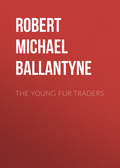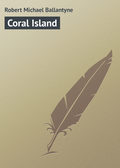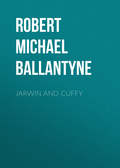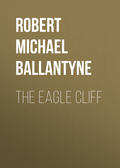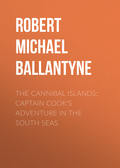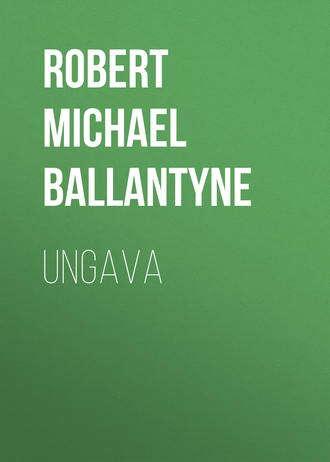
Robert Michael Ballantyne
Ungava
Chapter Fourteen.
The pursuit—Seal-spearing—The giant’s despair
When the young Esquimau began to recover from the lethargic state into which his wound had thrown him, he found himself lying at the bottom of the women’s oomiak with his old grandfather by his side, and a noisy crew of children and dogs around him. Raising himself on his elbow, he brushed the clotted blood and hair from his temples, and endeavoured to recall his scattered faculties. Seeing this, the old crone who had saved his life laid down her paddle and handed him a sealskin cup of water, which he seized and drank with avidity. Fortunately the wound on his forehead, although it had stunned him severely at first, was trifling, and in a few minutes after partaking of the cool water, he recovered sufficiently to sit up and look around him.
Gradually his faculties returned, and he started up with a troubled look.
“Where are the Allat? Where is my wife?” he exclaimed vehemently, as his eye fell on the prostrate form of his still insensible grandfather.
“Gone,” answered several of the women.
“Gone!” repeated the youth, gazing wildly among the faces around him in search of that of his wife. “Gone! Tell me, is she in one of the other oomiaks?”
The women trembled as they answered, “No.”
“Have the Allat got her?”
There was no reply to this question, but he did not need one. Springing like a tiger to the stern of the oomiak, he seized the steering paddle, and turning the head of the boat towards the shore, paddled with all his energy. Nearly two hours had elapsed since they had commenced their flight, and as all danger of pursuit was over the moment the Indians turned their backs on the sea, the Esquimaux had gradually edged in-shore again, so that a few minutes sufficed to run the prow of the oomiak on the shingle of the beach. Without saying a word, the young man sprang over the side, drew a hunting-spear from the bottom of the boat, and hurried back in the direction of the deserted village at the top of his speed. The women knew that nothing could stop him, and feeling that he was quite able to take care of himself, they quietly put to sea again, and continued their voyage.
The limbs of the young Esquimau, as we have already said, were gigantic and powerful, enabling him to traverse the country at a pace which few of his fellows could keep up with; and although a stern-chase is proverbially a long one, and the distance between two parties travelling in opposite directions is amazingly increased in a short space of time, there is no doubt that he would have overtaken his Indian foes ere many hours had passed, but for the wound in his head, which, although not dangerous, compelled him more than once to halt and sit down, in order to prevent himself from falling into a swoon. Hunger had also something to do with this state of weakness, as he had eaten nothing for many hours. In his hasty departure from the boat, however, he had neglected to take any provisions with him, so that he had little hope of obtaining refreshment before arriving at the village, where some scraps might perhaps be picked up.
Slowly, and with a reeling brain, he staggered on; but here no relief awaited him, for every scrap of food had been either taken away or destroyed by the Indians, and it was with a heavy sigh and a feeling akin to despair that he sat down beside the blackened ruins of his late home.
But Esquimaux, more than other men, are accustomed to reverses of fortune, and the sigh with which he regarded the ruins of his hut had no reference whatever to the absence of food. He knew that about this time the mouth of the river would be full of ice, carried up by the flood-tide, and that seals would, in all probability, be found on it; so he started up, and hastening along the beach soon gained the floes, which he examined carefully. A glance or two sufficed to show him that he was right in his conjecture. On a sheet of ice not more than a couple of hundred yards from shore were two seals fast asleep. These he prepared to stalk. Between the floe and the shore ran a stream of water twenty yards broad. Over this he ferried himself on a lump of loose ice; and, on reaching the floe, he went down on his hands and knees, holding the spear in his right hand as he advanced cautiously towards his victim.
The Esquimau seal-spear is a curious weapon, and exhibits in a high degree the extraordinary ingenuity of the race. The handle is sometimes made of the horn of the narwal, but more frequently of wood. It has a movable head or barb, to which a long line of walrus hide or sealskin is attached. This barb is made of ivory tipped with iron, and is attached to the handle in such a way that it becomes detached from it the instant the animal is struck, and remains firmly imbedded in the wound with the line fastened to it, while the handle floats away on the water or falls on the ice, as the case may be.
When the Esquimau had approached to within a hundred yards, he lay down at full length and slowly worked himself forward. Meanwhile the seals raised their heads, but seeing, as they imagined, a companion coming towards them, they did not make for their holes, which were a few yards distant from them. Having drawn near enough to render the animals suspicious, the young giant now sprang up, rushed forward, and got between one seal and its hole just as its more active companion dived into the water. In another moment the deadly lance transfixed its side and killed it. This was a fortunate supply to the Esquimau, whose powers of endurance were fast failing. He immediately sat down on his victim, and cutting a large steak from its side, speedily made a meal that far exceeded the powers of any alderman whatsoever! It required but a short time to accomplish, however, and a shorter time to transfer several choice (junks) chunks to his wallet; with which replenished store he resumed his journey.
Although the man’s vigour was restored for a time, so that he travelled with great speed, it did not last long, owing to the wound in his head, which produced frequent attacks of giddiness, and at last compelled him, much against his will, to halt for a couple of hours’ repose. Glancing round, in order to select a suitable camping ground, he soon observed such a spot in the form of a broad, overhanging ledge of rock, beneath which there was a patch of scrubby underwood. Here he lay down with the seal blubber for a pillow, and was quickly buried in deep, untroubled slumber. In little more than two hours he awoke with a start, and, after a second application to the contents of the wallet, resumed his solitary march. The short rest seemed to have quite restored his wonted vigour, for he now stalked up the banks of the river at a rate which seemed only to accelerate as he advanced. As has been already said, these banks were both rugged and precipitous. In some places the rocks jutted out into the water, forming promontories over which it was difficult to climb; and frequently these capes terminated in abrupt precipices, necessitating a détour in order to advance. In other places the coast was indented with sandy bays, which more than doubled the distance the traveller would have had to accomplish had he possessed a kayak. Unfortunately in his hasty departure he neglected to take one with him; but he did his best to atone for this oversight by making almost superhuman exertions. He strode over the sands like an ostrich of the desert, and clambered up the cliffs and over the rocks—looking, in his hairy garments, like a shaggy polar bear. The thought of his young and pretty bride a captive in the hands of his bitterest foes, and doomed to a life of slavery, almost maddened him, and caused his dark eye to flash and his broad bosom to heave with pent-up emotion, while it spurred him on to put forth exertions that were far beyond the powers of any member of his tribe, and could not, under less exciting circumstances, have been performed even by himself. As to what were his intentions should he overtake the Indians, he knew not. The agitation of his spirits, combined with the influence of his wound, induced him to act from impulse; and the wild tumult of his feelings prevented him from calculating the consequences or perceiving the hopelessness of an attack made by one man, armed only with knife and spear, against a body of Indians who possessed the deadly gun.
Alas! for the sorrows of the poor human race. In all lands they are much the same, whether civilised or savage—virtue and vice alternately triumphing. Bravery, candour, heroism, in fierce contest with treachery, cowardice, and malevolence, form the salient points of the record among all nations, and in all ages. No puissant knight of old ever buckled on his panoply of mail, seized his sword and lance, mounted his charger, and sallied forth singlehanded to deliver his mistress from enchanted castle, in the face of appalling perils, with hotter haste or a more thorough contempt of danger than did our Esquimau giant pursue the Indians who had captured his bride; but, like many a daring spirit of romance, the giant failed, and that through no fault of his.
On arriving at the rocky platform beside the spring where we first introduced him to the reader, the Esquimau sat down, and, casting his spear on the ground, gazed around him with a look of despair. It was not a slight matter that caused this feeling to arise. Notwithstanding his utmost exertions, he had been unable to overtake the Indians up to this point, and beyond this point it was useless to follow them. The mountains here were divided into several distinct gorges, each of which led into the interior of the country; and it was impossible to ascertain which of these had been taken by the Indians, as the bare, rocky land retained no mark of their light, moccasined feet. Had the pursuer been an Indian, the well-known sagacity of the race in following a trail, however slight, might have enabled him to trace the route of the party; but the Esquimaux are unpractised in this stealthy, dog-like quality. Their habits and the requirements of their condition render it almost unnecessary; so that, in difficult circumstances, their sagacity in this respect is not equal to the emergency. Add to this the partial confusion created in the young giant’s brain by his wound, and it will not appear strange that despair at length seized him, when, after a severe journey, he arrived at a spot where, as it were, half a dozen cross-roads met, and he had not the most distant idea which he had to follow. It is true the valley of the river seemed the most probable route; but after pursuing this for a whole day without coming upon a vestige of the party, he gave up the pursuit, and, returning to the spring beside the rock, passed the night there with a heavy heart. When the sun rose on the following morning he quitted his lair, and, taking a long draught at the bubbling spring, prepared to depart. Before setting out, he cast a melancholy glance around the amphitheatre of gloomy hills; shook his spear, in the bitterness of his heart, towards the dark recesses which had swallowed up the light of his eyes, perchance for ever; then, turning slowly towards the north, with drooping head, and with the listless tread of a heart-broken man, he retraced his steps to the sea-coast, and, rejoining his comrades, was soon far away from the banks of the Caniapuscaw River.
Chapter Fifteen.
End of the voyage—Plans and prospects—Exploring parties sent out
Three weeks alter the departure of the Esquimaux from the neighbourhood of Ungava Bay, the echoes of these solitudes were awakened by the merry song of the Canadian voyageurs, as the two canoes of Stanley and his comrades swept down the stream and approached the spring at the foot of the flat rock.
As the large canoe ran its bow lightly on the sand, the first man who leaped ashore was La Roche. He seemed even more sprightly and active than formerly, but was a good deal darker in complexion, and much travel-stained. Indeed, the whole party bore marks of having roughed it pretty severely for some time past among the mountains. Edith’s face was decidedly darker than when she left Moose, and her short frock considerably shorter in consequence of tear and wear.
“Bad luck to ye, Losh! Out o’ the way, an’ let yer betters land before ye,” exclaimed Bryan, as he jumped into the water, and dragged the canoe towards the beach.
The only marks that rough travelling had put on Bryan were one or two additional wrinkles in his battered white hat; as for his face, it was already so thoroughly bronzed by long exposure, that a week or two more or less made no difference in its hue.
“Jump into my arms, Miss Edith,” said François, as he stood in the water beside the canoe.
“Steady, boy; mind the gum,” cried Massan, as Oolibuck strained the canoe roughly in shouldering a package.
“Look out ashore, there,” cried Dick Prince, throwing the tent poles on the beach as he spoke.
Regardless of the warning, Gaspard did not “look out,” and received a rap on the leg from one of the poles, whereat he growled savagely, and threw down a sack, which rested on his shoulder, so violently that it nearly knocked over Ma-istequan, who was passing at the time with the camp-kettle in his hand.
“What an ould buffalo it is!” exclaimed Bryan, pushing Gaspard rudely aside with his left shoulder, and hitching off La Roche’s cap with his right, as he sprang back to the canoe for another load. “Pardonay mwa, Losh, may garson,” he exclaimed, with a broad grin. “Now thin, boys, out wid the fixin’s. Faix it’s mysilf is plazed to git ashore anyhow, for there’s nothin’ gone into my intarior since brickfust this mornin’.”
At this moment the bow of the other canoe grated on the sand, and Frank Morton leaped ashore.
“Capital place to camp, Frank,” said Stanley, who had just finished pitching the tent on the scrimp herbage that forced its way through the sand. “There’s a splendid spring of pure water below yonder rock. I’ve just left my wife and Eda busy with the tea-cups, and La Roche preventing them from getting things ready, by way of helping them.”
“It does indeed seem a good place,” replied Frank, “and might do for temporary headquarters, perhaps, while we make excursions to the coast to fix on a spot for our new home.”
Stanley gazed contemplatively around him as his friend spoke. “Hand me the telescope, Frank; it strikes me we are nearer the sea than you think. The water here is brackish, and yonder opening in the mountains might reveal something beyond, if magnified by the glass.”
After a lengthened survey of the surrounding hills, Frank and Stanley came to the conclusion that they could make nothing of it, at least that night; and as it was becoming gradually dark, they resolved to postpone all further consideration of the subject till the next day.
Meanwhile, the men busied themselves in preparing supper, and Chimo unexpectedly lent them some assistance by bringing into camp a ptarmigan which he had just killed. True, Chimo had, in his innocence, designed this little delicacy of the season for his own special table; but no sooner was he seen with the bird between his teeth, than it was snatched from him and transferred to the pot forthwith.
The following day was an era in the existence of the travellers. For the first time since commencing their arduous voyage, the cargoes were left behind, and the canoes paddled away, light and buoyant, on a trip of investigation. Stanley had rightly judged that they were now near the sea, and the great breadth of the river led him to believe that there might be water sufficient to float the vessel in which the goods for the station were to be forwarded. If this should turn out as he expected, there could not be a better spot for establishing a fort than that on which they had encamped, as it was situated just below the last rapids of the river; had a fine spring of fresh water in its vicinity; and was protected from the cold blasts of winter, to some extent at least, by the surrounding mountains.
“Now, Frank,” added Mr Stanley, after stating his opinion on this point, “what I mean to do is this: I shall take the large canoe, with Dick Prince, François, Gaspard, La Roche, and Augustus—the last to interpret should we fall in with Esquimaux, whom I am surprised not to have found hereabouts. With these I will proceed to the sea, examine the coast, observe whether there be any place suitable for building on, and, if all goes well, be back to supper before sunset. You will take the other canoe, with Bryan, Massan, Oolibuck, and Ma-istequan, and proceed down the opposite side of the river a short way. Examine the shores there, and above the island; see whether there be any place better than where we stand for a permanent residence; and at night we shall compare notes. My wife and Eda shall remain in camp under the care of Oostesimow and Moses.”
“And pray who is to defend your poor wife and innocent child in the event of an attack by a band of savage natives?” inquired Mrs Stanley, as she joined her husband and Frank.
“No fear of the wife and child,” replied Stanley, patting his better half on the shoulder. “If Indians should find out the camp, Oostesimow can palaver with them; and should Esquimaux pay you a visit, Moses will do the polite. Besides, had you not interrupted, I was going to have given special instructions to Frank regarding you. So, Master Frank, be pleased to take Eda off your shoulder, and give ear to my instructions. While you are examining the other side of the water, you will keep as much as possible within eye-shot, and always within ear-shot, of the camp. In a still day like this a gun-shot can be heard five or six miles off; and should you see any sign of the natives having been here recently, return instantly to the camp.”
Frank promised implicit obedience to these instructions, and the whole party then set to work to pile the goods on a ledge in the steep cliffs behind the spring, so that a fortress was soon formed, which, with two such stout and courageous men as Moses and Oostesimow, armed with two guns each, a brace of pistols, two cutlasses, and an ample supply of ammunition, could have stood a prolonged siege from much more practised enemies than Indians or Esquimaux. After having completed these defensive arrangements, and provided occupation for those who remained in camp, by laying on them the duty of having the goods examined, in order to see that nothing had been damaged by wet or rough usage, the two canoes pushed from the shore, and bounded lightly away, while the men sang merrily at their easy labour; for now that the canoes were light, they might have been propelled by two men. Frank directed his course obliquely up the river, towards the island already alluded to, and Stanley proceeded with the current towards the narrows beyond which he expected to catch sight of the sea.
After passing above the island, which was found to be low and thinly covered with vegetation and a few scrubby bushes, Frank and his men pushed over to the other side and proceeded carefully to examine the coast. It was found to be much the same as that which they had just left. A narrow belt of sandy and shingly beach extended along the margin of the river, or, as it might be more appropriately termed, the lake, at least in as far as appearance went. This strip or belt was indented here and there with numerous bays and inlets, and in many places was intersected by rocky capes which jutted out from the mountains. These mountains were bare and precipitous, rising abruptly, like those on the other side, from the edge of the sand, and ascending in a succession of terraces, whose faces were so steep that it was almost impossible to scale them. They could be ascended in succession, however, by means of the ravines and numerous gullies which rose in rugged and zigzag lines from the beach to the mountain tops. In the very first of these gullies in which the exploring party landed, they found the remains of an Esquimau summer encampment. These consisted of a few stunted trees, which appeared to have been built in the form of rude huts; but they were thrown about in some confusion, and altogether bore evidence of having remained in a state of ruin for many years. Another discovery of a more satisfactory kind was made—namely, the tracks of deer, which were so fresh as to induce Frank to take his rifle and mount the ravine in search of the animals, accompanied by Massan, whose natural temperament was exceedingly prone to enjoy the excitement of the chase. So much, indeed, was this the case, that the worthy guide had more than once been on the point of making up his mind to elope to the backwood settlements of the States, purchase a rifle and ammunition there, don a deerskin hunting-shirt, and “make tracks,” as he styled it, for the prairies, there to dwell and hunt until his eye refused to draw the sight and his finger to pull the trigger of a Kentucky rifle. But Massan’s sociable disposition came in the way of this plan, and the thought of leading a solitary life always induced him to forego it.
“It’s my ’pinion, sir,” remarked the guide, as he followed Frank up the ravine, the sheltered parts of which were covered with a few clumps of stunted pines—“it’s my ’pinion that we’ll have to cut our logs a long bit up the river, for there’s nothin’ fit to raise a fort with hereabouts.”
“True, Massan,” replied Frank, glancing from side to side, hunter fashion, as he walked swiftly over the broken ground; “there’s not a tree that I can see big enough to build a backwoods shanty with.”
“Well, master, ’twill do for firewood, if it’s fit for nothin’ else, and that’s a blessin’ that’s not always to be comed by everywhere. Let’s be thankful for small matters. I see sticks growin’ up them gullies that’ll do for stakes for the nets, an’ axe handles, an’ paddles, an’ spear shafts, an’—”
The honest guide’s enumeration of the various articles into which the small timber of the place might be converted was brought to a sudden pause by Frank, who laid his hand on his shoulder, and while he pointed with the butt of his rifle up the ravine, whispered, “Don’t you see anything else up yonder besides trees, Massan?”
The guide looked in the direction indicated, and by an expressive grunt showed that his eye had fallen on the object referred to by his companion. It was a deer which stood on an overhanging ledge of rock, high up the cliffs—so high that it might easily have been mistaken for a much smaller animal by less practised sportsmen. Below the shelf on which it stood was a yawning abyss, which rendered any attempt to get near the animal utterly hopeless.
“What a pity,” said Frank, as he crouched behind a projecting rock, “that it’s out of shot! It would take us an hour at least to get behind it, and there’s little chance, I fear, of its waiting for us.”
“No chance whatever,” replied Massan decidedly. “But he’s big enough to cover from where we stand.”
“To cover! Ay, truly, I could point straight at his heart easy enough—indeed I would think it but slight boasting to say I could cover his eye from this spot—but the bullet would refuse to go, Massan; it’s far beyond shot.”
“Try, sir, try,” exclaimed the guide quickly, for as they spoke the deer moved. “I’ve been huntin’ on the Rocky Mountains afore now, an’ I know that distance cheats you in sich places. It’s not so far as you think—”
He had scarcely finished speaking when Frank’s rifle poured forth its contents. The loud echoes of the crags reverberated as the smoke floated away to leeward. The next instant the deer sprang with one wild bound high into the air—over the cliff—and descending with lightning speed through the dark space, was dashed almost in pieces on the rocks below.
Massan gave a low chuckle of satisfaction as he walked up to the mangled animal, and pointing to a small round hole just over its heart, he said, “The old spot, Mr Frank; ye always hit them there.”
Having paid Frank this compliment, Massan bled the animal, which was in prime condition, with at least two inches of fat on its flanks, and having placed it on his shoulders, returned with his companion to the canoe.
While Frank was thus engaged, Stanley had descended towards the shores of Ungava Bay, which he found to be about twenty-five miles distant from the encampment beside the spring. He made a rapid survey of the coast as they descended, and sounded the river at intervals. When he reached its mouth he had made two important discoveries. The one was, that there did not seem to be a spot along the whole line of coast so well fitted in all respects for an establishment as the place whereon their tents were already pitched. The other was, that the river, from its mouth up to that point, was deep enough to float a vessel of at least three or four hundred tons burden. This was very satisfactory, and he was about to return to the camp when he came upon the deserted Esquimau village which, a few weeks before, had been the scene of a murderous attack and a hasty flight. On a careful examination of the place, the marks of a hasty departure were so apparent that Stanley and his men made a pretty near guess at the true state of affairs; and the former rightly conjectured that, having made a precipitate flight in consequence of some unexpected attack, there was little probability of their returning soon to the same locality. This was unfortunate, but in the hope that he might be mistaken in these conjectures, and that the natives might yet return before winter, he set up a pole on a conspicuous place, and tied to the top of it a bag containing two dozen knives, one dozen fire-steels, some awls and needles, several pounds of beads, and a variety of such trinkets as were most likely to prove acceptable to a savage people.
While Bryan was engaged in piling a heap of stones at the foot of this pole to prevent its being blown down by the wind, the rest of the party re-embarked, and prepared to return home; for although the camp beside the spring was scarcely one day old, the fact that it was likely to become the future residence of the little party had already invested it with a species of homelike attraction. Man is a strange animal, and whatever untravelled philosophers may say to the contrary, he speedily makes himself “at home” anywhere!
“Hallo, Bryan!” shouted Stanley from the canoe, “look sharp; we’re waiting for you!”
“Ay, ay, yer honour,” replied the Irishman, lifting a huge mass of rock; “jist wan more, an’ it’ll be stiff an’ stidy as the north pole himself.” Then in an undertone he added, “‘Look sharp,’ is it ye say? It’s blunt ye are to spake that way to yer betters. Musha! but it’s mysilf wouldn’t give a tinpinny for all that bag houlds, twinty times doubled; an’ yit thim haythens, thim pork-faced Huskimos, ’ll dance round this here pole wi’ delight till they’re fit to dhrop. Och! but salvages is a quare lot; an’, Bryan, yer a cliver boy to come this far all the way to see thim.”
With this self-complimentary conclusion, Bryan resumed his place at the paddle, and the party returned to the camp.
Here they found things in a most satisfactory state. Frank and his party had returned, and the deer, now cut up into joints and steaks, was impaled on a number of stakes of wood, and stuck up to roast round a large and cheering fire. The savoury steam from these, with the refreshing odour of the tea-kettle, produced a delectable sensation in the nostrils of the hungry explorers. Stanley’s tent was erected with its back towards the mountains and its open door towards the fire, which lighted up its snug interior, and revealed Mrs Stanley and Edith immersed in culinary operations, and Chimo watching them with a look of deep, grave sagacity—his ears very erect, and his head a good deal inclined to one side, as if that position favoured the peculiar train of his cogitations. La Roche was performing feats of agility round the fire, that led one to believe he must be at least half a salamander. At a respectful distance from Stanley’s tent, but within the influence of the fire, the men were employed in pitching, for the first time, the large skin tent which was to be their residence until they should build a house for themselves; and on a log, within dangerous proximity to the mercurial La Roche, sat Frank Morton, busily employed in entering in his journal the various events of the day.
There was much talk and loud laughter round the fire that night, for the different parties had much to tell and much to hear regarding the discoveries that had been made, and discussions as to the prospects of the expedition were earnest and long. It was generally admitted that first appearances were, upon the whole, favourable, although it could not be denied that the place looked dreadfully barren and rugged. Under the happy influence of this impression, and the happier influence of the savoury steaks on which they had supped, the entire party lay down to rest, and slept so profoundly that there was neither sound nor motion to indicate the presence of human beings in the vast solitudes of Ungava, save the fitful flame of the fire as it rose and fell, casting a lurid light on the base of the rugged mountains, and a sharp reflection on the dark waters.



